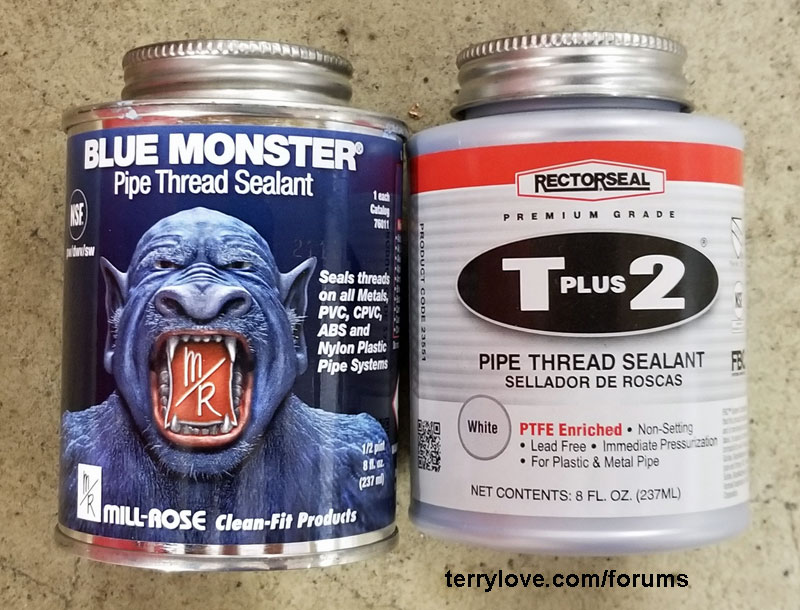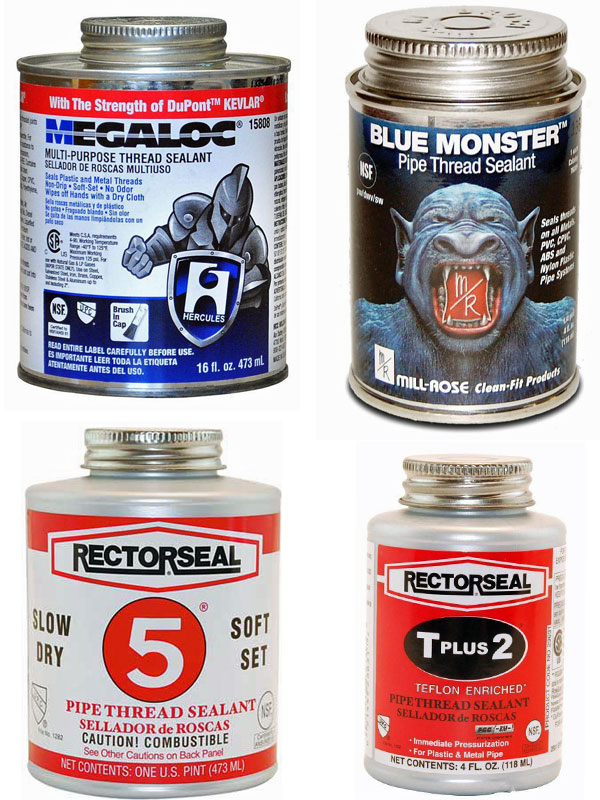Clog
Member
What is the dopist pipe dope?
TL forum searches for "favorite pipe thread sealant" and "best pipe thread sealant" yielded no results.
There is a such a plethora of products out there today. Up until now, I've mostly used Rectorseal #5 in the yellow tube, have tried Rectorseal T+2, and over the years have used other random "pipe dopes", such as Great White from Oatey, or whatever happened to be available or handy. I think the earliest thread sealant I ever used was the John Sunshine Mitee Dripless Pipe Joint Compound, which came in a yellow box and a yellow tube as well. That goes back several decades ago. It became a DAP Inc brand.

In recent years, many pipe thread sealants have emphasized the color blue, for some reason. Blue Monster, Blue Magic, Blue Block, Blue Megalock. Even Rectorseal got in on this blue colored pipe sealing act with their trademarked "Tru-Blu." Oatey re-enters the fray with their Great Blue Pipe Joint Compound. The industrial brand LA-CO checks in with their LeakTite Blue, not to mention Weld-On with their Blue Seal, and then Spears has their Blue 75, and even Northern offers a Premium Grade Blue. What's the deal with all this blue?
I don't care about color. I want a good, no, the very best pipe thread sealant for lubricating and sealing lead free brass fittings for use in potable hot water.
And I do mean sealant, not necessarily dope. Dope just made for a dope thread title. Sealant, on the other hand, can also include anaerobic resin compounds. I ran across an article called "Guidelines for Choosing a Pipe Thread Sealant" , edited by Joseph L. Foszcz, in Plant Engineering. Ignoring the portions describing teflon tape, I'd like to quote where he discusses the advantages and disadvantages between pipe dope and anaerobic resin compound sealants, which he clearly prefers over pipe dope:
So, what type of pipe thread sealant do you use on metal threaded pipe joints for potable hot water, steam, as well as for gas service applications? Your favorite, most reliable sealant. The kind you apply where you know that you will never be called back.
TL forum searches for "favorite pipe thread sealant" and "best pipe thread sealant" yielded no results.
There is a such a plethora of products out there today. Up until now, I've mostly used Rectorseal #5 in the yellow tube, have tried Rectorseal T+2, and over the years have used other random "pipe dopes", such as Great White from Oatey, or whatever happened to be available or handy. I think the earliest thread sealant I ever used was the John Sunshine Mitee Dripless Pipe Joint Compound, which came in a yellow box and a yellow tube as well. That goes back several decades ago. It became a DAP Inc brand.

In recent years, many pipe thread sealants have emphasized the color blue, for some reason. Blue Monster, Blue Magic, Blue Block, Blue Megalock. Even Rectorseal got in on this blue colored pipe sealing act with their trademarked "Tru-Blu." Oatey re-enters the fray with their Great Blue Pipe Joint Compound. The industrial brand LA-CO checks in with their LeakTite Blue, not to mention Weld-On with their Blue Seal, and then Spears has their Blue 75, and even Northern offers a Premium Grade Blue. What's the deal with all this blue?
I don't care about color. I want a good, no, the very best pipe thread sealant for lubricating and sealing lead free brass fittings for use in potable hot water.
And I do mean sealant, not necessarily dope. Dope just made for a dope thread title. Sealant, on the other hand, can also include anaerobic resin compounds. I ran across an article called "Guidelines for Choosing a Pipe Thread Sealant" , edited by Joseph L. Foszcz, in Plant Engineering. Ignoring the portions describing teflon tape, I'd like to quote where he discusses the advantages and disadvantages between pipe dope and anaerobic resin compound sealants, which he clearly prefers over pipe dope:
edited by Joseph L. Foszcz (and further edited and paraphrased by me for brevity) said:PIPE DOPE:
Pipe dope relies on a solvent carrier and hardens when the solvent evaporates. The resulting seal adheres to all plastic and metal pipes and effectively blocks leak paths. Because it contains solvents, pipe dope has a tendency to shrink over time as the solvent dissipates. This condition creates the potential for the dope to pull away from the thread walls or crack, allowing leaks to develop.
Advantages: chemical composition is compatible with all pipe materials, including plastic. Pipe dopes harden quickly and produce a moderate to strong seal.
Disadvantages: Solvent-based pipe dopes can lose their effectiveness as the result of heat aging. When the seal shrinks and cracks, leaks can develop. This possibility is especially true with systems that are subjected to significant vibration. Pipe dopes may lack sufficient resistance to solvents.
Recommended Uses: Solvent-based pipe dopes provide an adequate seal in applications where high temperatures and pressures are NOT expected. Pipe dopes offer MINIMAL resistance against vibration. They are acceptable when the installation of a piping system does not require adjustment of components more than a few minutes after assembly.
ANAEROBIC RESIN COMPOUNDS
Anaerobic resin compounds use a different cure chemistry than solvent-based pipe dopes and do not contain solvents. The cure begins when the sealant is confined within the threads of the metal pipe connection and air is excluded. Without solvent content, the cured material does not shrink or crack, and maintains its sealing properties even after heat aging. Because of their chemistry, anaerobic resin compounds exhibit excellent temperature and solvent resistance.
Advantages: Anaerobic compounds fill the voids between pipe threads, creating a seal. The compounds cure slowly, providing additional time to make adjustments to pipe system components without damaging the seal. Once cured, the compounds form a strong seal that resists the effects of temperature, pressure, solvents, and vibration. Joints sealed with anaerobic resins can be taken apart with standard hand tools. Many anaerobic thread sealants contain Teflon or similar lubricants which aid assembly and reduce the potential for damage to pipe system components.
Disadvantages: Because of their chemical composition, compatibility of anaerobic resin compounds with plastic pipe and fittings should be verified before use. Although these compounds cure sufficiently for many immediate uses, a 24-hr period should be observed before activating high-pressure systems or allowing significant shock or vibration. Anaerobic resins can be difficult to remove from clothing or gloves.
Recommended Uses: This class of sealants provides the strongest, longest-lasting seal presently available. They are recommended for temperatures up to 300 F, pressures up to 10,000 psi, and where vibration will be encountered. These sealants are the choice when installers must make minor adjustments to a piping system.
So, what type of pipe thread sealant do you use on metal threaded pipe joints for potable hot water, steam, as well as for gas service applications? Your favorite, most reliable sealant. The kind you apply where you know that you will never be called back.
Last edited:

